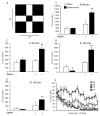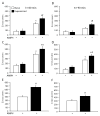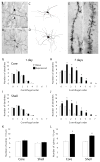Neuroplasticity in the mesolimbic system induced by natural reward and subsequent reward abstinence
- PMID: 20015481
- PMCID: PMC2854191
- DOI: 10.1016/j.biopsych.2009.09.036
Neuroplasticity in the mesolimbic system induced by natural reward and subsequent reward abstinence
Abstract
Background: Natural reward and drugs of abuse converge on the mesolimbic system, where drugs of abuse induce neuronal alterations. Here, we tested plasticity in this system after natural reward and the subsequent impact on drug responses.
Methods: Effects of sexual experience in male rats on behavioral sensitization and conditioned place preference associated with d-amphetamine (AMPH) and Golgi-impregnated dendrites and spines of nucleus accumbens (NAc) cells were determined. Moreover, the impact of abstinence from sexual behavior in experienced males on these parameters was tested.
Results: First, repeated sexual behavior induced a sensitized locomotor response to AMPH compared with sexually naive control subjects observed 1, 7, and 28 days after last mating session. Second, sexually experienced animals formed a conditioned place preference for lower doses of AMPH than sexually naive males, indicative of enhanced reward value of AMPH. Finally, Golgi-Cox analysis demonstrated increased numbers of dendrites and spines in the NAc core and shell with sexual experience. The latter two alterations were dependent on a period of abstinence of 7-10 days.
Conclusions: Sexual experience induces functional and morphological alterations in the mesolimbic system similar to repeated exposure to psychostimulants. Moreover, abstinence from sexual behavior after repeated mating was essential for increased reward for drugs and dendritic arbors of NAc neurons, suggesting that the loss of sexual reward might also contribute to neuroplasticity of the mesolimbic system. These results suggest that some alterations in the mesolimbic system are common for natural and drug reward and might play a role in general reinforcement.
Copyright 2010 Society of Biological Psychiatry. Published by Elsevier Inc. All rights reserved.
Figures




References
-
- Pucilowski O, Kostowski W. Aggressive behaviour and the central serotonergic systems. Behavioural brain research. 1983;9:33–48. - PubMed
-
- Hernandez L, Hoebel BG. Feeding and hypothalamic stimulation increase dopamine turnover in the accumbens. Physiology & behavior. 1988;44:599–606. - PubMed
-
- Noel MB, Wise RA. Ventral tegmental injections of a selective mu or delta opioid enhance feeding in food-deprived rats. Brain research. 1995;673:304–312. - PubMed
-
- Martel P, Fantino M. Influence of the amount of food ingested on mesolimbic dopaminergic system activity: a microdialysis study. Pharmacology, biochemistry, and behavior. 1996;55:297–302. - PubMed
-
- Martel P, Fantino M. Mesolimbic dopaminergic system activity as a function of food reward: a microdialysis study. Pharmacology, biochemistry, and behavior. 1996;53:221–226. - PubMed
Publication types
MeSH terms
Substances
Grants and funding
LinkOut - more resources
Full Text Sources
Other Literature Sources

